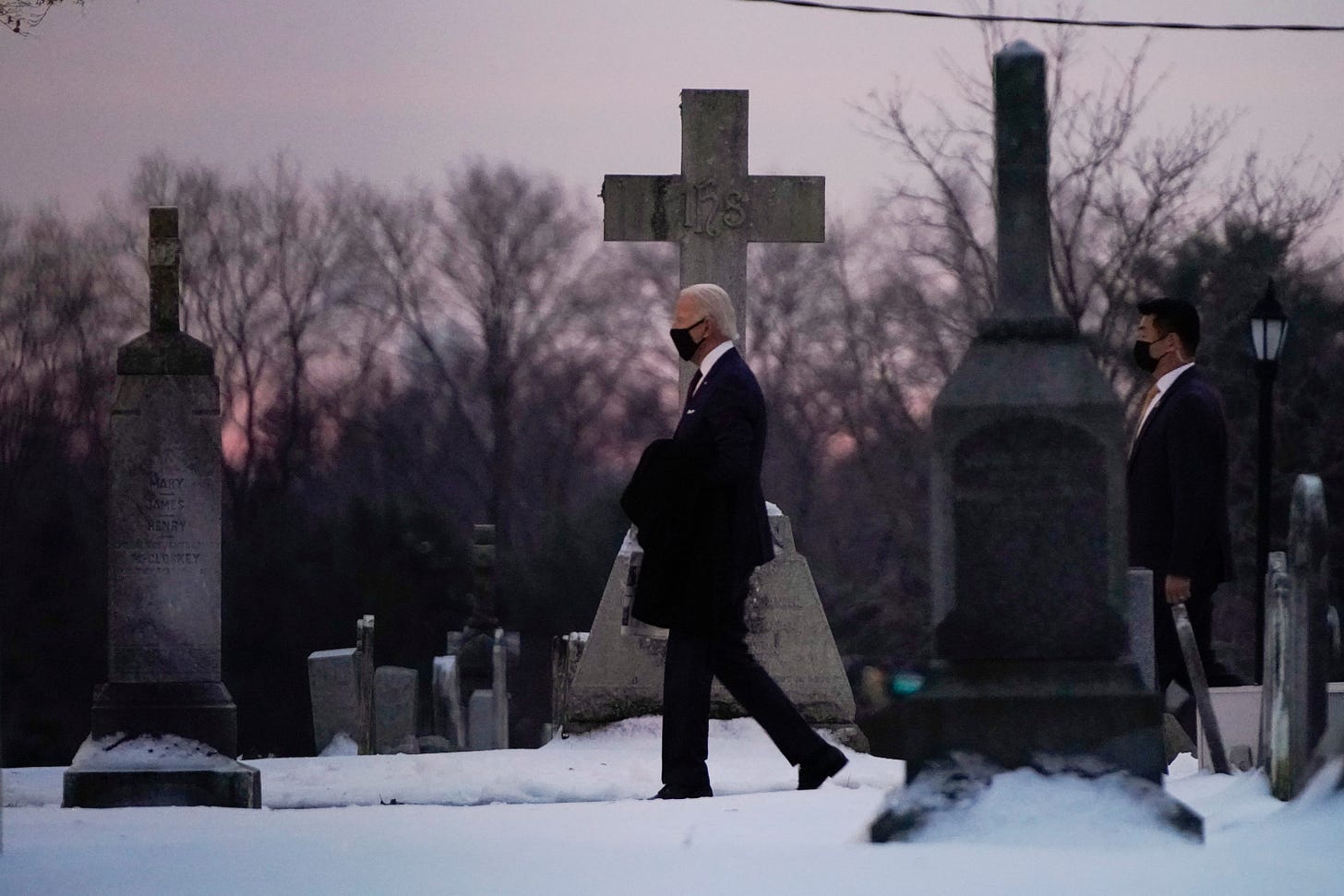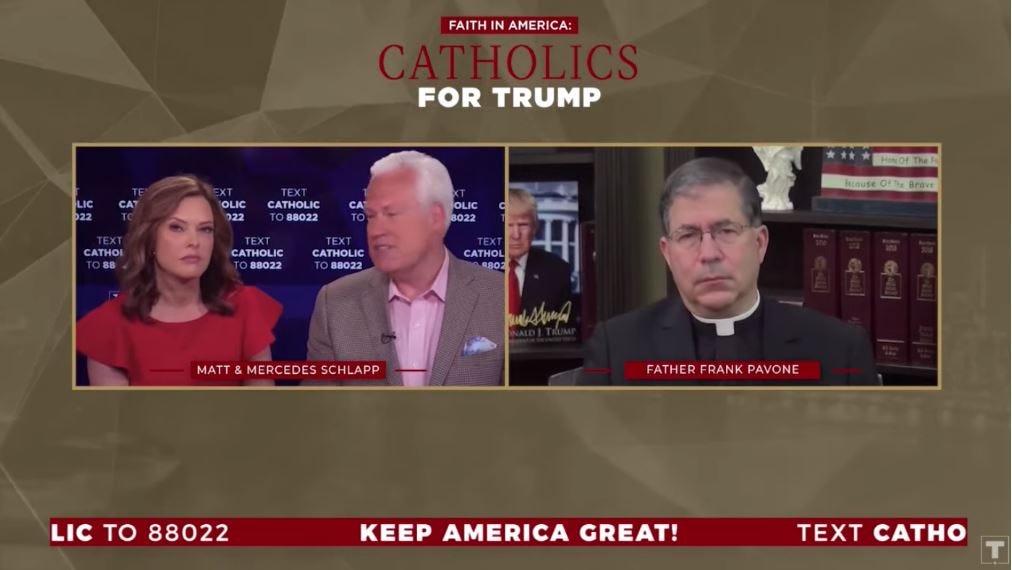The Return of the Communion Wars
John Kerry dealt with this during the 2004 campaign—but he lost. Biden will have to deal with it while he’s in office.

As anyone who pays attention knows, Joe Biden is a practicing Catholic who regularly attends mass. It’s a central theme of his Joe-from-Scranton imagery. And while the Roman Catholic Church is the single largest unified religious institution in the United States, Biden is just the second Catholic to be elected president. In his 2020 race, Biden was able to avoid a public spectacle of tangling with the Catholic church on abortion in a way that John Kerry could not during his presidential run. I should know: In 2004, I worked for the Republican National Committee on Catholic outreach, and a large part of what we did was fire up the pro-life vote for President George W. Bush. And one of the ways we did this was a big campaign the Sunday before the election to have volunteers go to Catholic churches in swing states and place a flyer on peoples’ windshields for them to see when they came out of mass. By the time that Sunday came, Missouri was a pretty solid lock for Bush, and I was transferred to a different part of the state to do different Get Out The Vote (GOTV) work, but the flyer campaign went through anyway. The “literature” wasn’t much different than what you get in the mail from candidates: glossy, well produced, about half a sheet of paper, and on both sides messaging highlighting why Catholics should vote for the Protestant Bush over Kerry, a Catholic who “often” attended church. Other big issues at the time were gay marriage, which was on the ballot in a lot of states, stem cell research, and euthanasia. Those differences were highlighted, too. (I don’t think capital punishment, which Bush supported and Kerry opposed, made the cut, for obvious reasons.)
The operation was designed so that the volunteers could get the whole thing done without the pastors knowing about it—or, more to the point, having to say No—because the church getting directly involved in politicking is dicey. (Besides, we weren’t about to rob our fellow Catholics of an opportunity to ask for forgiveness.) Selling Boy Scout popcorn, Girl Scout cookies, or poppies for Memorial Day are all fine. But politicking is not allowed, per the Catholic church’s 501(c)(3) status and the Johnson Amendment. The Archdiocese of St. Louis at the time had just gotten a new archbishop, Raymond Burke, who made waves when he announced that John Kerry was not welcome to receive Holy Communion in his archdiocese. It sowed division among the U.S. Conference of Catholic Bishops (USCCB). Reporters followed Kerry to church to report on whether or not he was denied communion. Burke’s reward? A promotion to cardinal from Pope Benedict XVI. But Benedict took the unusual step of retiring, paving the way for a Jesuit pope, Francis. Who promptly demoted Burke. Had Biden crisscrossed the country campaigning last year, the 2004 Burke blowup would have looked small in comparison to the likely controversy. Obviously, that didn’t happen. But now that Biden is president, expect it to. Here’s Fr. Billy Kosco, pastor of St. Henry Catholic Church in Buckeye, Arizona, at a recent mass.
While his church enjoys 501(c)(3) tax exempt status as non-political, he continues his attack on Biden. pic.twitter.com/xtEJhCf5pS
— Ron Filipkowski (@RonFilipkowski) March 20, 2021
As a Catholic, this is a very unusual homily to hear. Politicians are never named; if a pastor (or priest) wants to be aggressive, he will usually walk right up to the line of politicking and talk about abortion and sin and elections, but not cross it. The flock will understand. At my old parish, the Basilica of St. Mary in Old Town Alexandria, which is a fairly conservative church, I’ve seen people get up and walk out when the line is straddled. More often, these reminders of Catholic conviction are found in the general intercessions during a mass. There’s a whole category of intercessory prayers dedicated on the USCCB website to the various aspects of the pro-life beliefs.
Thinking back to my work in 2004, it’s remarkable to see how outreach from the GOP to Catholics has been transformed. In the 2020 race, a Trump campaign coalitions group, Catholics for Trump, became increasingly overt in its operations, leaning on Newt Gingrich, Matt and Mercedes Schlapp, and the controversial Fr. Frank Pavone.

Fr. Pavone, to those who aren’t immersed in Catholic pro-life politics, put an aborted fetus on an altar during the 2016 election, an act that shocked and horrified many Catholics, but elated others. Naturally, that stunt got him the Trump campaign gig in 2020. His political campaigning may have jeopardized his standing as a priest; at any rate, he ultimately resigned from the Trump campaign after three months because somebody above him told him to cut it out. Shortly after getting elected, President Trump was pushing hard on making churches more political, knowing that these nonprofits entities were a potential way to outsource campaigning to many millions to religious leaders. He even signed an executive order in 2017 to that effect, as John Wagner and Sarah Pulliam Bailey explain:
The order, Trump said, removes the financial threat faced by tax-exempt churches from the Internal Revenue Service when pastors speak out on behalf of political candidates. But some experts said it amounts to a mostly symbolic gesture with little likelihood of changing how the agency polices the issue.
But that doesn’t change the underlying law requiring nonprofit organizations to refrain from a variety of explicit political activities. Such a change would require Congress to pass new legislation and a president to sign it into law. An executive order cannot do what Trump repeatedly claimed it did. Fr. Billy Kosco doesn’t seem like a Fr. Pavone, and while what he said might get him in trouble with his diocese, with 35,000-plus priests in the United States, you can bet that some man of the cloth will try to deny Biden communion as COVID-19’s effects are mitigated and the president travels to different parts of the country more routinely. Those priests expecting to emulate Kosco and Burke should be careful what they wish for—because Pope Francis is no Pope Benedict XVI.


